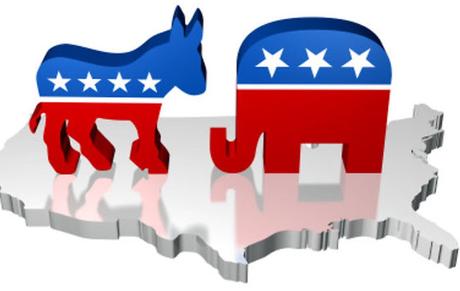 (This graphic image is from pinsdaddy.com.)
(This graphic image is from pinsdaddy.com.)Dahlia Lithwick has written an excellent article at Slate.com about the contrasting morality of the two major political parties (Democrats and Republicans) -- and how being the moral party might actually hurt Democrats (although it shouldn't). I urge you to read the entire article, but here is a part of it:
My own larger concern is that becoming the party of high morality will allow Democrats to live with themselves but that the party is also self-neutering in the face of unprecedented threats, in part to do the right thing and in part to take ammunition away from the right—a maneuver that never seems to work out these days. When Al Franken, who has been a champion for women’s rights in his tenure in the Senate, leaves, what rushes in to fill the space may well be a true feminist. But it may also be another Roy Moore. And there is something deeply naïve, in a game of asymmetrical warfare, and in a moment of unparalleled public misogyny, in assuming that the feminist gets the seat before it happens. . . .
We are at a moment in this country in which entire institutions that existed to protect women—from the courts, to our criminal statutes, to our workplace protections—have proved not only incapable of protecting us but also to be tools used to shame and silence us. The question we now face is really about which institutions need to be blown apart altogether and recreated to promote justice, and which institutions do not or cannot. The Senate, I would submit, is not about to be blown up and created anew, with greater institutional solicitude for women. Not now. And that means that when it comes to the Senate, we play by the institutional rules and norms as they exist, even as those rules and norms devolve into empty shells. The alternative is a game of righteous ball, in which the object is pride and purity, and Dems are the only ones playing.
In the event that you doubt that the war is asymmetric, ask yourself how long it took for the same GOP that was disavowing Moore a month ago to embrace him, and to embrace him again in the face of new evidence. Ask how long it took from when Trump made it clear that he would wage war on Robert Mueller for Hugh Hewitt—purporting to speak on behalf of “a large swath of responsible center-right observers”—to call for an investigation into Mueller. This because a former FBI official sent pro-Hillary texts that now raise, according to Hewitt, “the possibility of shattering public confidence in a number of long-held assumptions about the criminal-justice system generally and the FBI and the Justice Department specifically.” The president just claimed the FBI is “in tatters,” but it’s the former official, who Mueller pulled off the investigation for the texts, who shatters confidence in the agency?
Who knows why the GOP has lost its last ethical moorings? But this is a perfectly transactional moment in governance, and what we get in exchange for being good and moral right now is nothing. I’m not saying we should hit pause on #MeToo, or direct any less fury at sexual predators in their every manifestation. But we should understand that while we know that our good faith and reasonableness are virtues, we currently live in a world where it’s also a handicap.
Unilateral disarmament is tantamount to arming the other side. That may be a trade worth making in some cases. But it’s worth at least acknowledging that this is the current calculus. It’s no longer that when they go low, we get to go high. They are permanently living underground. How long can we afford to keep living in the clouds?

